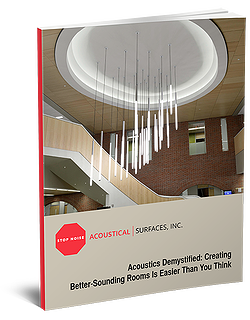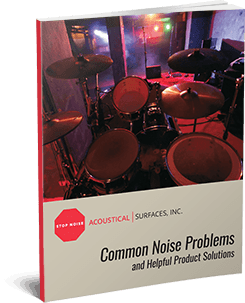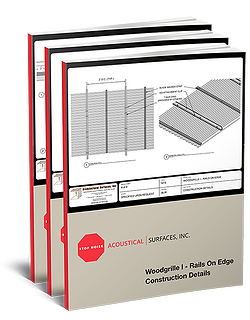How to Soundproof HVAC Systems
The HVAC systems in our homes and offices are essential pieces of keeping us comfortable. Prior to the advent of HVAC systems, our only options were burning fires in the winter and hoping for a nice breeze to blow through our open windows in the summer. With as much comfort as they provide, a noisy HVAC system can be a real relaxation and productivity killer.
Learning how to soundproof HVAC systems isn’t tough, and it can cut down on a lot of unwanted sounds. If you’ve ever been disrupted by the sound of your noisy HVAC system, understanding the causes of the noise and how simply you may be able to reduce it, you’ll want to read on.
Why we soundproof HVAC systems
While HVAC systems provide us with comfortable interior temps and humidity levels, no matter the season or region, they are forcing airflow, which can create a substantial amount of noise. Your furnace and air conditioner create vibrations while running, and the air passing through your ductwork does the same. All those vibrations lead to noisy distractions that can affect our sleep at home and our productivity at work.
Lots of us have grown accustomed to the noise and don’t know how much better things can be with a soundproof HVAC system. But, by taking a few simple steps, we can reduce stress and create a more energy efficient system. With a few simple products and a basic understanding of how to soundproof HVAC systems, you can substantially cut the noise, as well as a decent chunk of your energy bill.
How to soundproof HVAC systems
Before we learn how to minimize AC noise or furnace hum, we’ve got to determine where the sounds are coming from and what kind of soundproofing we’re after. Noisy ductwork and vibrations from the unit are two of the main culprits we’ll have to deal with.
How to soundproof HVAC systems: Dealing with noisy furnaces and air conditioning units
One of the main sources of sounds in an HVAC system is the unit providing the heat or AC. When those units kick in, the fans turn on, and the energy they create can turn into vibrations that reach far beyond the unit itself. To keep those vibrations where they belong, you need to isolate the unit. Here’s how to soundproof HVAC units.
Install an isolation pad or vibration mounts below the unit
Depending on where your furnace or AC unit is located, a great deal of vibrational energy can pass directly from the unit to the floor below. This can cause unwanted noise and also annoying vibrations that disturb everyday activities.
Placing the unit on an isolation pad or vibration mounts will absorb those vibrations before they pass into the floor, greatly reducing one of the primary and most disruptive causes of HVAC noise.
Wrap the unit with sound damping materials
The vibrations created by your unit don’t only travel downward. If you want to achieve a high level of soundproofing, it’s a good idea to wrap the unit itself with sound damping materials.
Many HVAC sound dampening materials are very easy to work with, and you most likely won’t need to hire anyone to install it if you don’t want to. Simply cut to size, peel the backing, and adhere it where you want it.
Build an HVAC closet
If you really want to reduce the noise caused by your HVAC system, you may want to consider building a dedicated closet to house the unit. When we build and insulate HVAC closets, we not only hide unsightly utilities but we also absorb both vibrations and airborne sound waves before they can escape the vicinity.
To act as an effective HVAC sound baffle, you’ll want to make sure to build your closet with dense walls and a heavy door. The insulation you use in your HVAC closet must be dense enough to absorb sound waves but also safe to use near the unit. Once it’s well insulated, don’t forget to seal it all up well. Anywhere air can pass through is a potential passage for sound waves.
If you’re learning how to soundproof HVAC closets or boiler rooms in industrial settings, acoustical curtains and blankets can be a good insulation solution. They trap a lot of sound waves and are easy to install and reposition when needed. Acoustical curtains and blankets can also be used to enclose outdoor units, making them a very versatile and economical option.
Replace your aging HVAC system
If your HVAC system seems overly loud, it may be time to replace it. Many newer units are much quieter than those sold 20 or 30 years ago, and they are much more energy efficient as well. Upgrading can reduce the amount of noise you’ve got to deal with, making learning how to soundproof HVAC systems much simpler.
How to soundproof HVAC systems: Dealing with ducts
HVAC systems can be excessively noisy due to the fact they are built on hollow metal ductwork that criss-crosses your home or business. That environment is ripe for allowing noise to build and reverberate. In order to keep them quiet, you’ve got to treat the ductwork. Here’s a quick rundown of how to soundproof heating ducts.
Wrap ducts with sound damping materials or lagging
If you’re experiencing significant vibrational noises emanating from your ductwork, a simple fix is to wrap the ducts. By wrapping ducts and pipes with lagging or sound damping materials, you can keep vibrations contained to the ducts and pipes themselves. Duct sound insulation is a simple but very effective sound proof ducting solution.
Insulate your ducts
Wrapping the outside of your ducts will help reduce vibrations but won’t do a whole lot to absorb sound waves that are traveling inside of them. If you want to reduce those noises, either for privacy or just peace and quiet, you’ll want to utilize acoustic lining for ductwork.
A good ductwork insulation product should be porous enough to absorb sound waves but also be made of materials that are non toxic and non irritating, as that air has to be pumped back into the room by you and your loved ones. It’s also a good idea to check the fire safety rating on the product, as well as things like the water vapor absorption, bacteria resistance, and corrosion resistance on the product before installing it. No one wants to trade quiet HVAC vents for breathing in harmful fibers or vapors, so make sure the product you use is intended for this purpose.
Insulating your ducts will also provide the added benefit of making your ducts more efficient by preventing leakage, so it delivers on multiple levels.
Utilize duct silencers
One of the most efficient ways of controlling sounds inside of your ductwork is to prevent sounds from entering in the first place. Duct silencers are a sound baffle for ductwork that is generally placed between the unit and the ductwork, keeping the noises from making their way into the ducts and transferring into every room in the home or office.
If you work in an office environment where privacy is important or even mandated, duct silencers are a great way to control the sound waves traveling through your HVAC system. Not only will duct silencers reduce the sounds generated by the fans, but they do a great job in preventing speech and other sounds from traveling down the length of the ducts and into other rooms. Your clients will be glad you took the time to learn how to soundproof HVAC ductwork to protect their privacy, whether they know you did it or not.
Soundproofing non HVAC vents
Not all vents in homes and offices are connected to the HVAC system. If you’ve got a simple vent meant to deliver ventilation on hot days or to remove fumes from heating or cooling elements, those vents can allow outside noises to seep into the room. If you’ve grown tired of trying to keep those outside sounds where they belong, it may be time to do something about it. If you want to soundproof a vent that isn’t connected to your HVAC system, your options look a little different.
Remove the vent
The simplest solution may just be to remove the vent entirely. If it isn’t a safety issue, removing the vent and plugging the hole with new layers of insulation and sheetrock can solve your noise issues with very little work.
Cover the vent
If you don’t want to completely remove the vent, you can choose to cover it instead. You can buy relatively inexpensive magnetic covers that pretty much anyone can apply relatively easily. As a basic rule of thumb, if air travels through vents, noise travels through vents. By blocking the airflow, you will also block out a lot of the outside noises.
Put your plan together
Now that you know the basics of how to soundproof HVAC systems, it’s time to decide how you’re going to tackle your noise issues. Each HVAC system is as unique as the home or business it’s placed in, so be sure to ask the pros if you have any questions. They can help you decide where your issues lie and which specific products will deliver the most HVAC noise reduction bang for the buck.






